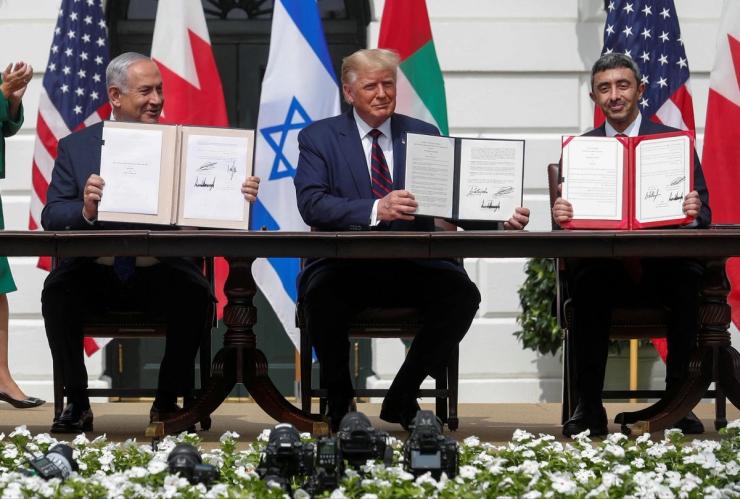Yossi’s view
Last week, a historic agreement was reached to implement the first stage of the Trump Peace Initiative, which includes the release of all hostages and a cessation of hostilities in Gaza. This deal aligns with the guiding principles set by Israel’s Security Cabinet: the return of all hostages, ensuring that Gaza’s future governance excludes Hamas and other parties that support terrorism, and the complete disarmament of Hamas.
The agreement was made possible through the determined efforts of US President Donald Trump, with broad support from the US Congress and regional partners — first and foremost, the United Arab Emirates. The UAE’s constructive engagement and quiet diplomacy were instrumental in achieving this breakthrough. Once again, the UAE has proven to be a true partner for peace with Israel, demonstrating that peace should be accomplished not by applying pressure, but through understanding and mutual benefit — a lesson other nations in the region would do well to recognize.
Having long embraced partnership and coexistence, the UAE recognizes that dialogue, not hostility, brings stability and progress. Its commitment to moderation, development, and cross-regional cooperation paved the way for this moment.
Five years ago, a bold vision became reality. The Abraham Accords, signed in Washington by Sheikh Abdullah bin Zayed Al Nahyan, alongside President Trump and Prime Minister Benjamin Netanyahu, opened a new era of prosperity and peace. That same spirit of courage and leadership continues to guide the region today as it moves toward implementing the first phase of the Trump Peace Initiative. Bridges of trust built in 2020 now enable a historic achievement, one that brings the hostages home, ends the fighting, and renews hope for both Israelis and Palestinians.
Since the signing of the Accords, Israel and the UAE have woven a relationship of unprecedented depth and trust. Together, we have advanced from symbolic, on-paper peace to a strategic partnership that plays a crucial role in shaping stability and encouraging regional responsibility. In just five years, we have seen more than 45 ministerial visits from Israel to the UAE, 15 Emirati delegations to Israel, and 40 agreements across education, energy, health, and trade. Cooperation frameworks such as the Negev Forum, I2U2, and the India-Middle East-Europe Economic Corridor (IMEC) have strengthened dialogue and trust.
Economically, the transformation has been remarkable. Bilateral trade has surpassed $11.7 billion, with the Comprehensive Economic Partnership Agreement (CEPA) eliminating tariffs on more than 96% of goods and creating opportunities in AI, agritech, cyber, and renewable energy. Emirati investments, like Mubadala’s $1.1 billion in Israel’s Tamar gas reservoir, symbolize a shared economic future. Beyond commerce, more than 1.5 million tourists have traveled between Israel and the UAE, making cultural and social exchange part of our daily lives.
As Israel’s Ambassador to the UAE, I have repeatedly emphasized that lasting peace requires rejecting any Hamas involvement in Gaza’s future governance, ensuring the group’s disarmament, and guaranteeing the Strip’s demilitarization. These steps are vital to turning the new agreement into a sustainable peace that benefits both Israelis and Palestinians. The UAE’s role in this process has been pivotal, as a trusted partner that understands that stability is rooted in dialogue and mutual recognition.
In a war forced upon Israel by Hamas’s murderous attack on Oct. 7, 2023, Israel has demonstrated determination and strength, defeating Hamas militarily, isolating it politically, and building an international consensus against its continued rule in Gaza. The agreement now paves the way toward Israel’s goals since day one: not control over Gaza, but the safe return of our people and the end of terrorism; to ensure lasting calm, not a partial and temporary solution.
For this vision to endure, regional states must not hesitate to voice their support for Israel’s security, its right to self-defense, and its government’s decision to sign the peace agreement. Only through collective commitment can we ensure that the sacrifices of recent years will open a new chapter of coexistence and hope — the very spirit that inspired the Abraham Accords.
The Accords are not just about Israel and the UAE. They are a model for what the Middle East, and indeed the world, can achieve when nations choose dialogue over division. They have demonstrated resilience in turbulent times, proving that genuine peace can endure even under challenging circumstances. Looking ahead, our shared agenda is ambitious, with a focus on expanding cooperation in advanced technologies, AI, food and water security, quantum computing, and sustainability. Initiatives like IMEC highlight the transformative potential of these partnerships to reshape global trade.
Israel remains fully and unequivocally committed to the Abraham Accords, to expanding the circle of peace, deepening our partnerships, and ensuring that the promise of stability, prosperity, and coexistence becomes the enduring legacy of our generation. Above all, the Accords will continue to serve the people of the region, delivering real benefits and opportunities.
The Abraham Accords have already changed history. Together, we will ensure they continue to shape our collective future.
Yossi Shelley is the Ambassador of Israel to the United Arab Emirates.
In this article:
Room for Disagreement
The UAE’s relationship with Israel has become strained in recent years over the devastation in Gaza and threats from some Israeli politicians to annex the West Bank — a move that would effectively end hopes for a Palestinian state. Emirati foreign ministry official Lana Nusseibeh said last month that annexation was a “red line” that betrays the spirit of the Abraham Accords, while another UAE official condemned Israel’s strike on a Hamas compound in Doha as treacherous. Still, any Emirati response would likely stop at downgrading diplomatic ties rather than severing them, Reuters reported, citing people familiar with the matter.
Notable
- The fifth anniversary of the Abraham Accords on Sept. 15 was marked, not celebrated. Trade ties remain intact, but the broader regional integration envisioned under the accords has yet to materialize, Semafor reported.
- Israel’s self-defense policies risk engulfing the region in turmoil and harming the country’s stability. Saudi Arabia’s mediation for a two-state solution may offer an exit, Saudi professor Dr. Turki Faisal Al-Rasheed writes in Arab News.


